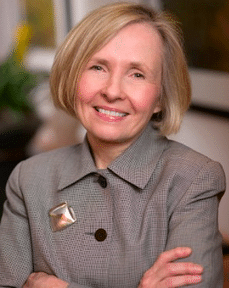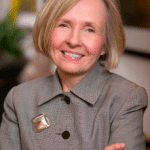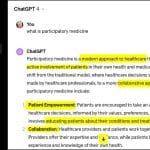When I describe the concept of participatory medicine, people who work in the healthcare industry often confuse it with other change initiatives, like social determinants of health or better access to care. It’s a different story when I describe participatory medicine to people who are “pure patients”, i.e. people who interact with the health system only as patients or caregivers. Pure patients uniformly respond with words of encouragement and with a story of their own about a difficult healthcare situation where often they weren’t respected or weren’t heard or weren’t understood.
Those reactions of pure patients reflect why the Society for Participatory Medicine is dedicated to changing the culture of healthcare relationships so people can have their very best health. It’s proven that when there is respect, listening to and consideration of patient needs, their preferences, and circumstances, that magic happens—patients understand better; treatment plans are formulated better; outcomes are better; costs are lower; satisfaction is higher for patient and clinician.
Getting that magic to happen depends in part on things like addressing social determinants of health, making shared decision-making a standard of care, and solving the myriad access issues that exist in healthcare, from the digital divide to the overall cost of healthcare. But that won’t fix everything.
After access enhancements are common, like transportation vouchers to help people get to their medical appointments, reliably affordable health plans are available, and digital divide has been bridged—when all those other miles of change are traveled and those changes embedded, there will still be a patient and a doctor in an exam room. If what happens between clinician and patient doesn’t evolve to embrace participatory medicine principles, the full value of all those other enhancements won’t be realized.
Broad use of the principles of participatory medicine by patients and clinicians could be the health system’s last mile of reform. Clinicians who follow participatory medicine principles will understand that above all, they must be worthy of and earn their patient’s trust. Too often today, patients must demonstrate that they are worthy of the care the clinician presents, which is the wrong way around. The clinician earns the patient’s trust by engaging the patient as an equal partner in every way – by educating, listening to, consulting, and honestly partnering with the patient.
Patients have responsibilities too. They must be more than passengers in the process of their health care. They must actively drive their own health and wellbeing by learning and acting on sound advice, by being forthright with their clinicians, raising questions, and relaying their values and situation. The participatory patient understands that his or her best health happens with a clinician who is a trusted partner, and when they work together.
I believe that the final mile of health care system change, participatory medicine, will dramatically transform how we give and receive health care for the best and will better the value of other health system innovations for us all.
Mary Hennings is Chairperson, Society for Participatory Medicine. She is a senior healthcare executive with 35+ years of broad health care experience. Her expertise is in formulating and implementing product and organizational innovations that deliver desired business results while supporting better care, coverage, and customer experiences.
Experience for yourself the power of participatory medicine at SPM’s Creative Learning Exchange, Advancing Health Equity Through Participatory Medicine. Buy virtual or in-person tickets here: https://www.eventbrite.com/e/advancing-health-equity-through-participatory-medicine-tickets-594076888967?aff=ebdssbdestsearch. Thanks!







Excellent blog and helpful to explain participatory medicine to those who don’t know what it is or how essential it is.
Randy Houk
Brava! Brava!
At the end of the day, that’s exactly what I am. Just a “pure patient.” Now somewhat of a patient advocate, in a small way. But nothing more than that.
For me, it comes down to exactly what you have said: a doctor and a patient in an exam room together, and what happens then. I understand that all of these other issues are also important, but as you say, when all of those other issues have been addressed (in some ideal future), it will still all come down to a doctor and a patient in an exam room, and what happens there.
Mary,
This is a beautiful statement of the significance of participatory / collaborative medicine. Along with “pure patients” in the room is a dedicated clinician who likely chose the profession to have the knowledge and skill to enable people to be healthier.
In prior years, the practice of medicine was having the right answer, based on substantial study and clinical training. Now, many health complaints and opportunities for health improvement depend on managing chronic conditions. Many diagnoses have treatment options that may hinge of personal quality of life priorities.
The partnership of clinician and patient is necessary for this type of medicine.
The new healthcare system is focused on organizational evolutions — continuum of care (ACOs); value-based medicine; health tech; merging of industries (providers, insurance companies, pharmacies, retail businesses delivering primary care). Now healthcare systems are merging across state lines. Many communities are in a medical monopoly — only one company owns the entire local healthcare system.
The Society of Participatory Medicine is the voice for the clinician and patient who are in conversation, building a trusting relationship, delivering and receiving the service that allows the clinician to help the patient feel better and enjoy good health.
Thank you for holding that space.
Really beautiful concept and nicely stated, Mary. However, we are fighting not just culture, but economics. Participatory medicine is based on the patient as “subject.” The financial motivation of providers is patient as object, to be processed quickly, albeit in a “consumer-friendly” way that keeps them loyal and “adherent.” This is not deliberately anti-participatory, but it becomes so. Having just come from HIMSS, the big money comes from selling tools to “engage” patients, not empower them!
Michael, you are absolutely correct. The “patient as object” approach, no matter how “patient friendly” it is disguised as, sees (and treats) patients as…
Interchangeable widgets…
In an assembly line of “health care”…
Delivered according to more or less rigid “guidelines” defining the standard of care for the generic (not a particular) patient…
Whose health or illness status is evaluated according to a bell curve that defines a group norm, without much or any nuance…
And who receives their health care in an institution with multiple physicians or PA providers who are, themselves, conceptualized as “widgets”…
Working on an interchangeable basis within the health-care venue…
Where they take whatever patient — known to them or unknown — who appears on their calendar that day.
Michael and Brenda,
I agree with your comments on the way the business of healthcare sees the role of the patient — as the object to be engaged, not empowered, and to see success as adherence rather than choice. A very simple example is that the quality measure for cancer screenings, such as breast cancer screening, requires that the patient gets the screening — rather than that the patient is informed and can choose whether or not to get the screening. The provider is scored on number of breast screenings done, not whether the patient was informed and provided with information.
What I have been thinking about lately is patient power. One basis of power is just saying no or choosing not to adhere. This arrow in the quiver is often used by patients; but it may not benefit the patient,
A rising source of power is the checkbook (or debit card). Patients are paying more and more of the cost of care. Through high deductibles. Through services rendered, but surprisingly not covered by health insurance. This can be the big items covered by the Surprise Billing legislation, or it can be something like a shingles vaccine. My hope is that there is a way to leverage this power, in non-emergency situations, so that patients become a more active consumer.
We are still objects in emergency situations — when it is so difficult to demand attention, explanations, cost estimates, and inclusion in the decision.
Speaking of emergency situations…. I went to the ER yesterday (long story; short version is, not a big issue) and was asked to sign a consent for treatment form. Electronic. Without reading it first.
I asked for a paper copy I could read. Among the things it said was that I gave the doctors and nurses permission to treat me as long as they informed me afterward what they had done.
I crossed that out and said that they had to inform me first and get my input and explicit permission — nothing after the fact.
I realize that a patient in immediate medical crisis like in an ER might not be a candidate for pre-informing, but that patient would also not be a candidate for signing a consent for treatment form. So…the form directs its comments to patients who are presumably awake and mentally competent to give permission–and one piece of that permission is for the doctor to inform them of what they DID, not what they planned or WANTED TO DO.
That makes the whole idea of informed consent a lie.
Mary,
In one sense, the clinician – patient encounter is the first mile and first moment of health care system change. I share your optimism, Mary, that the clinician and patient want the trusting collaboration of a trained medical professional and an individual with a health concern.
To everyone’s points about economics and the patient being an object, I couldn’t agree more. I hope that we as a Society can elbow our way into the conversation on Accountable Care. I didn’t explicitly include risk-based prospective payment with attendant quality metric rewards for providers on the list of innovations that I included in my post, but it should be listed. I don’t think carriers and providers will succeed to the degree they hope under these contracts with goals that only focus on narrow metrics and cost. And patient engagement measures assume a lot of passivity on the part of patients. Take a look at Press-Ganey surveys of patient satisfaction that are commonly used to measure provider performance in these contracts. There is nothing in them about the depth of partnership between clinicians and patients that I have seen. Full application of Participatory Medicine principles in ACO arrangements holds the promise to supercharge care quality, patient and clinician engagement, and lowering of cost. Several folks within the SPM family are discussing this and I think it deserves a lot more focus and attention. We need to make structural as well as interpersonal changes to succeed.
Agree, Mary. We need to make structural as well as interpersonal changes to succeed. The wild card, to me, is (1) how structural factors affect the ability of interpersonal changes to happen at all, and (2) the role of grass-roots initiation of / demand for change vs. institutional models and methods of change.
Mary,
Thank you for your response to our posts. I am glad that you articulated that SPM is addressing the participatory relationship within the context of value-based medicine, which is quickly becoming the dominant model in US healthcare.
Let me take a deep dive into understanding this sentence.
From your post: “I don’t think carriers and providers will succeed to the degree they hope under these contracts with goals that only focus on narrow metrics and cost.”
I take this to mean that the goal is better health outcomes, of which the narrow metrics are intended to be a proxy.
Right now, from my vantage point, the insurers and providers garnet revenue in the value-based system based on the metrics, whether or not those metrics do correlate with patient health outcomes. So, from my vantage point, which is front-line patient advocacy and system navigation, I see a gap between meeting the metrics and quality healthcare for patients. And my understanding of what you are saying is that the participatory medicine component is necessary to achieve true patient health outcomes.
I heartily agree with that connection, and I hope that SPM will work on both the clinician-patient / family relationship level and the system goal level to make this happen.